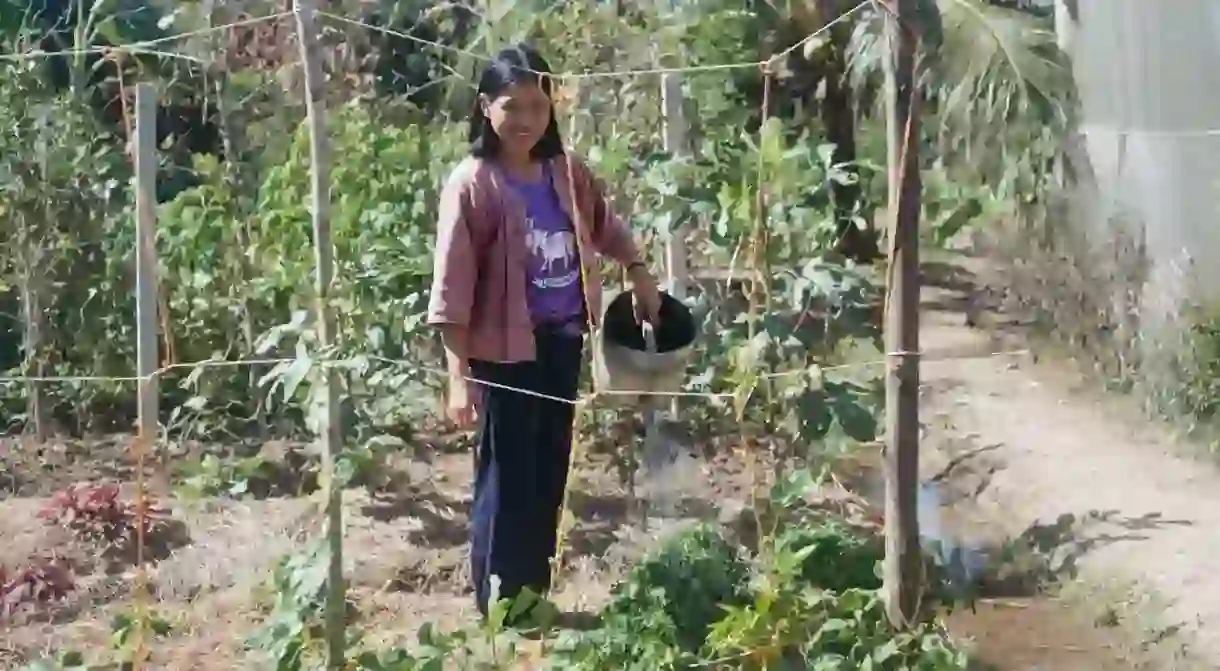Discover the Eco-Friendly Side of Chiang Mai with Earth Home

Are you ready to take a little detour off the main road and disconnect from the hustle and bustle of Chiang Mai city? If you’re looking to travel green, get involved in some natural earth building, or expand your knowledge of permaculture and organic farming, Earth Home is the place for you.
Earth Home is a special little haven amid the mountains of Northern Thailand, located about an hour or so North of Chiang Mai. The guesthouse, which is comprised of nine hand-built earth houses, is located in the quiet and modest little village of Maejo. Earth Home is primarily a guesthouse, although it also offers a variety of workshops including natural building, permaculture, cooking and self-empowerment courses throughout the year.

P’Thongbai, the founder, built Earth Home with the intention of strengthening Maejo village’s community while creating a space for collaboration, exchange and education. She wanted to help people reconnect to the land and each other.



Earth home offers a unique and intimate homestay experience. Guests are welcome to join in with daily activities, such as watering the gardens, helping out in the kitchen or even taking care of the farm animals. Meals are served in the communal dining hall, and guests are offered a variety of tasty traditional Thai dishes made with fresh organic produce straight from the gardens.



Each of the earth houses (also known as adobe houses or baandin in Thai) is uniquely structured and decorated, with beautiful illustrations adorning both the exterior and interior walls. Earth homes are sturdy, durable structures that can remain intact for up to thousands of years. The basic ingredients of an earth home are simple: clay, sand, rice husks, straw and water. Adobe houses are relatively cheap and easy to build. The first house, which P’Thongbai built by herself over ten years ago, is still in excellent condition.



P’Thongbai’s story
P’Thongbai was born in Maejo. She came from a poor family, so as a young woman, she decided to move to Bangkok in the hope of finding a good job and building a better life for herself. As the years passed, she became more and more disillusioned by the big city. She recalls, “when I lived in Bangkok, I had a good job, I made enough money. But I was wondering why I wasn’t happy.” She noticed everyone around her seemed to be working very hard and eating healthy, but people were getting sick all the time. “All people did was earn a lot of money, and then they would eventually get ill and spend the money in the hospital and I didn’t want that kind of life.”

One day she was watching TV and came across a show where King Bhumibol Adulyadej (the previous King of Thailand, who was an advocate of sustainable and natural farming) was giving a speech about organic farming. This stirred something in her—a desire to go back home, back to the village she had left 24 years before. She decided that Maejo was the place she would raise her children; she wanted them to know that life could be simpler and more enjoyable, and that money was not the most important thing for living a good life.



When she first moved back to her village, she started with her own little organic garden. From there she began to learn more about permaculture and natural farming. She attended a natural building course at Pun Pun Center for Self Reliance, a small organic farm in Maejo where she learned the ancient craft of earth building. From this point onwards, Earth Home began to come to life. Brick by brick and month by month, new houses were built.


P’Thongbai is passionate about sharing her knowledge and educating others. “I try and help the community by teaching them how to build houses and how to live the same way I’ve learned to live [all] these years,” she explains. Today, many of the houses in Maejo have a small garden where people grow their own organic food. “People know they need to eat more clean. When I first came back to Maejo, the village was very dirty, with plastic everywhere. Gradually people started to understand and change their ways, taking better care of themselves and the environment.”

Besides bringing more tourism to the area, the development of ecotourism in Maejo has encouraged people to grow their own food again, but most importantly it’s promoted an attitude of sharing among the villagers, both of resources and information.

The story of Earth Home and its founder is one that goes well beyond building beautiful homes out of earth. It’s a story about strengthening relationships, re-building a community, re-establishing a relationship with nature, and reconnecting to what really matters.

You can find out more about Earth Home by visiting by visiting their website.













